How cy.intercept Works

Gleb Bahmutov
Distinguished Engineer
Cypress.io
@bahmutov

📺 Watch this presentation at https://www.youtube.com/watch?v=LEeoQp1j93I
our planet is in imminent danger
https://lizkeogh.com/2019/07/02/off-the-charts/
+3 degrees Celsius will be the end.
survival is possible* but we need to act now
- change your life
- join an organization
AGENDA
-
Spying and stubbing
-
Network control with cy.route
-
window.fetch problem
-
-
Network control with cy.intercept
-
Problems vs problems
-
Future work
Spy on a method
const person = {
greet () {
console.log('Hello')
}
}// somewhere inside the app
person.greet()can we confirm the app calls "greet"?
Spy on a method
const person = {
greet () {
console.log('Hello')
}
}// somewhere inside the app
person.greet()cy.spy(person, 'greet').as('greet')cy.get('@greet')
.should('have.been.calledOnce')function spy(o, methodName) {
const method = o[methodName].bind(o)
o[methodName] = function () {
this.called += 1
return method.apply(null, arguments)
}
}Spy implementation
function stub(o, methodName, value) {
o[methodName] = function () {
this.called += 1
return value
}
}Stub implementation
1. Need object reference
const person = {
greet () {
console.log('Hello')
}
}// somewhere inside the app
person.greet()cy.spy(person, 'greet').as('greet')cy.get('@greet')
.should('have.been.calledOnce')1. Need object reference
const person = {
greet () {
console.log('Hello')
}
}
if (window.Cypress) {
window.person = person
}Maybe expose the reference when running inside Cypress
1. Need object reference
cy.spy(person, 'greet').as('greet')"person" is an implementation detail 😐
cy.spy(console, 'log').as('log')you can spy or stub Browser APIs (window, console, navigator, etc) 🙂
cy.get('@log')
.should('have.been.calledOnceWith', 'Hello')confirm the application's behavior at the periphery: DOM, console, cookies, network 🥳
Stubbing Browser API examples

Stubbing window.open
<a href="/about.html" target="_blank">About</a>
<script>
document.querySelector('a')
.addEventListener('click', (e) => {
e.preventDefault()
window.open('/about.html')
})
</script>How to prevent the window.open from opening in a new tab?
it('opens the about page', () => {
cy.visit('index.html')
cy.window().then(win => {
cy.stub(win, 'open').as('open')
})
cy.get('a').click()
cy.get('@open')
.should('have.been.calledOnceWithExactly', '/about.html')
})it('opens the about page', () => {
cy.visit('index.html')
cy.window().then(win => {
cy.stub(win, 'open').as('open')
})
cy.get('a').click()
cy.get('@open')
.should('have.been.calledOnceWithExactly', '/about.html')
})
it('opens the about page', () => {
cy.visit('index.html')
cy.window().then(win => {
cy.stub(win, 'open').callsFake((url, target) => {
expect(target).to.be.undefined
return win.open.wrappedMethod.call(win, url, '_self')
}).as('open')
})
cy.get('a').click()
cy.get('@open')
.should('have.been.calledOnceWithExactly', '/about.html')
})it('opens the about page', () => {
cy.visit('index.html')
cy.window().then(win => {
cy.stub(win, 'open').callsFake((url, target) => {
expect(target).to.be.undefined
return win.open.wrappedMethod.call(win, url, '_self')
}).as('open')
})
cy.get('a').click()
cy.get('@open')
.should('have.been.calledOnceWithExactly', '/about.html')
})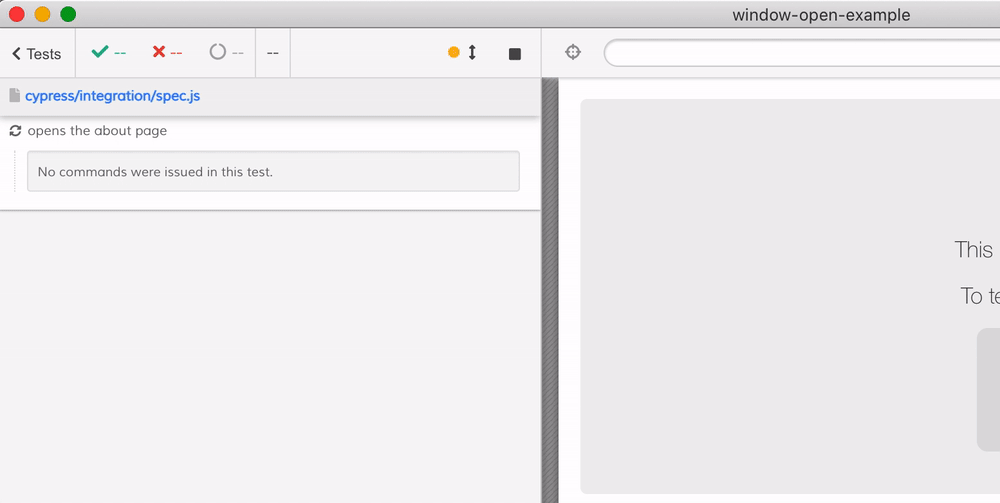
2. Timing matters
const person = {
greet () {
console.log('Hello')
}
}// somewhere inside the app
person.greet()cy.spy(person, 'greet').as('greet')cy.get('@greet')
.should('have.been.calledOnce')1
2
3
Auto-retry does this
it('opens the about page', () => {
cy.visit('index.html')
cy.window().then(win => {
cy.stub(win, 'open').as('open')
})
cy.get('a').click()
cy.get('@open')
.should('have.been.calledOnceWithExactly', '/about.html')
})1. set up the stub
2. then click
2. Timing matters
3. confirm browser behavior
<body>
<script>
window.open('/about.html')
</script>
</body>What if the app calls window.open immediately?
2. Timing matters
it('opens the about page', () => {
cy.visit('index.html')
cy.window().then(win => {
cy.stub(win, 'open').as('open')
})
})too late!
<body>
<script>
window.open('/about.html')
</script>
</body>What if the app calls window.open immediately?
2. Timing matters
it('opens the about page', () => {
cy.window().then(win => {
cy.stub(win, 'open').as('open')
})
cy.visit('index.html')
})⛔️ No, there is no window object yet
<body>
<script>
window.open('/about.html')
</script>
</body>What if the app calls window.open immediately?
2. Timing matters
it('opens the about page', () => {
cy.visit('index.html', {
onBeforeLoad (win) {
cy.stub(win, 'open').as('open')
}
}
})✅ window is there, but before any application code loads
<body>
<script>
window.open('/about.html')
</script>
</body>What if the app calls window.open immediately?
2. Timing matters
beforeEach(() => {
cy.on('window:before:load', (win) => {
cy.stub(win, 'open').as('open')
})
})
it('opens the about page', () => {
cy.visit('index.html')
})✅ Stub window on every page visited
💡 cy.on vs Cypress.on
beforeEach(() => {
cy.on('window:before:load', (win) => {
cy.stub(win, 'open').as('open')
})
})
it('opens the about page', () => {
cy.visit('index.html')
})using cy.on inside the callback
requires test or hook function
💡 cy.on vs Cypress.on
beforeEach(() => {
cy.on('window:before:load', (win) => {
cy.stub(win, 'open').as('open')
})
})
it('opens the about page', () => {
cy.visit('index.html')
})Cypress.on('window:before:load', (win) => {
delete win.fetch
})
it('falls back to XMLHttpRequest', () => {
cy.visit('index.html')
})using cy.on inside the callback
requires test or hook function
cannot use any cy commands
can be outside any test or hook
So What About Network Spying and Stubbing?
cy.server is...
cy.window().then(win => {
win.XMLHttpRequest = (options) => {
const ajax = {
open: cy.spy(),
send: cy.spy(),
...
}
...
return ajax
}
})cy.route is just book-keeping

cy.server and cy.route stub the call to XMLHttpRequest before it leaves the browser
Browser window
App iframe
If application was calling window.fetch
Cypress.on('window:before:load', (win) => {
delete win.fetch
// hope the app polyfills fetch
// via XMLHttpRequest
}){
"experimentalFetchPolyfill": true
}we will inject polyfill if necessary
cy.route limits
cy.window().then(win => {
cy.stub(win, 'fetch').resolves(...)
})essentially ...
- Does not behave like a real browser with caching, CORS, etc
- What about requests made from WebWorkers or ServiceWorkers?
- What about other requests like static resources?
Better Network Control



The new architecture
Intercept HTTP calls here
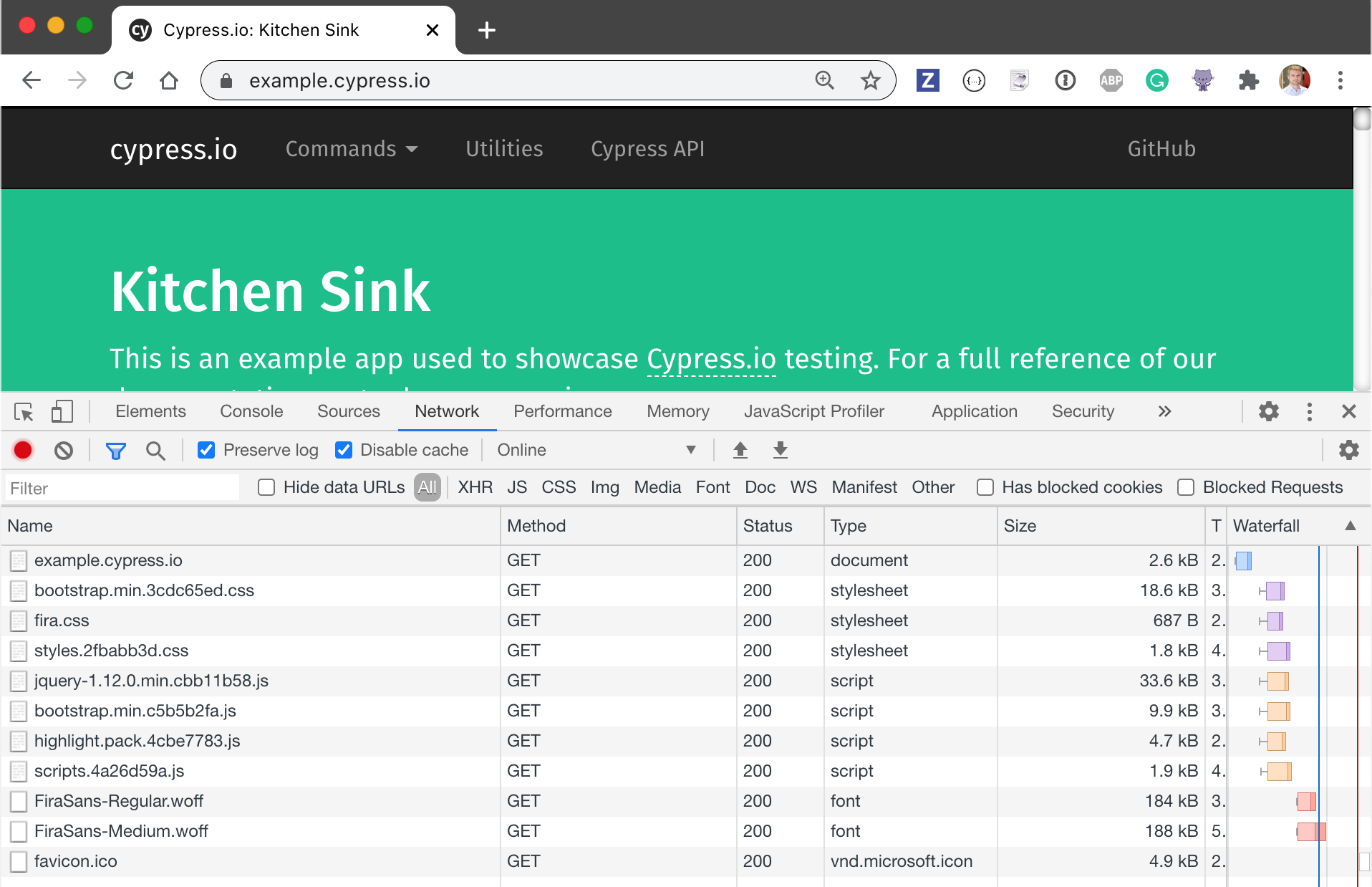
Any request can be observed or stubbed
(+ ServiceWorker, WebWorker)
cy.server()
cy.route()
Deprecated
Will be removed when we feel cy.intercept() can do it all
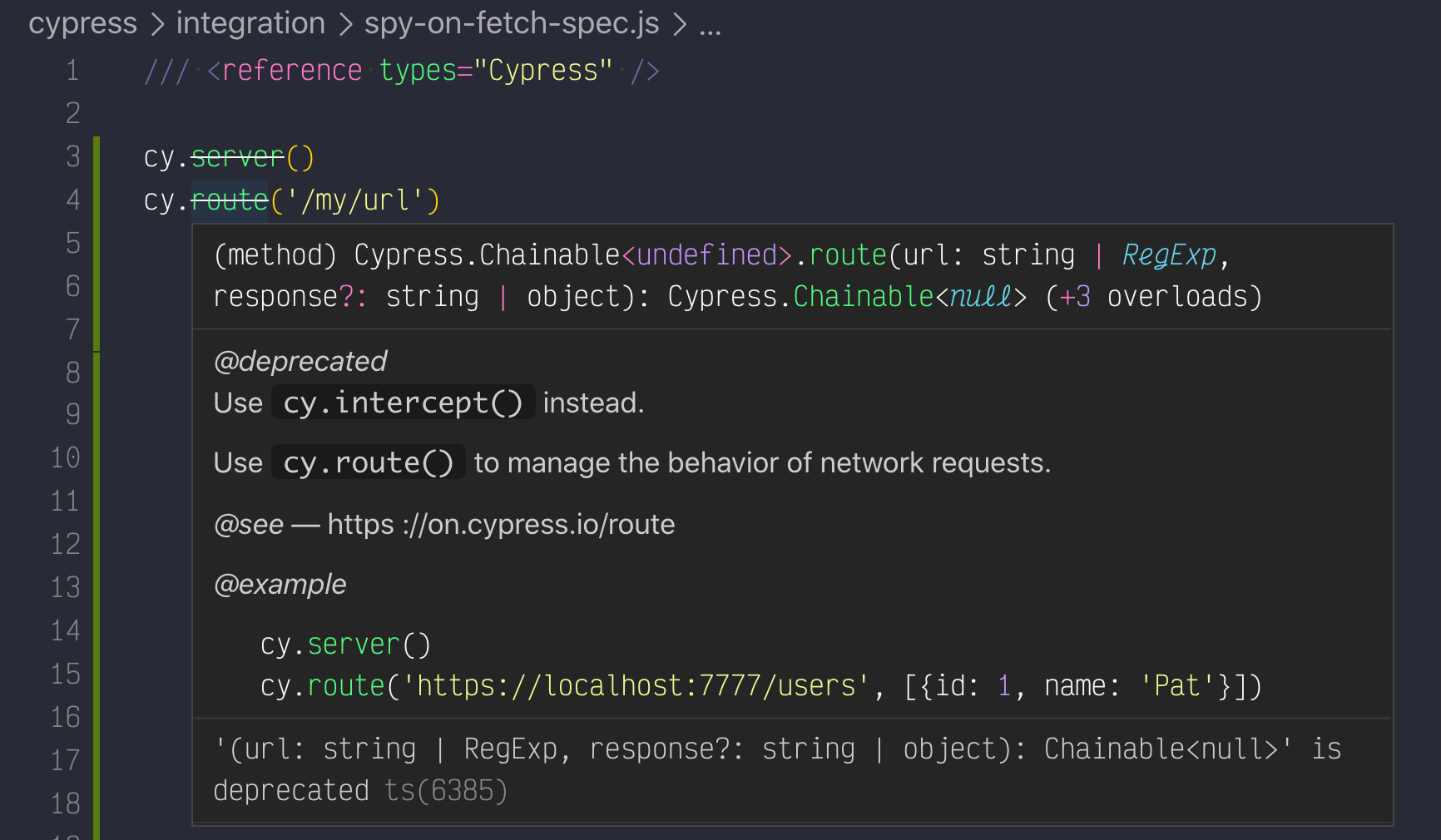
cy.intercept( routeMatcher )
Spy on requests matching the route
cy.intercept( routeMatcher, response )
Stub requests matching the route
cy.intercept(...).as('alias')
Give request an alias for waiting
General form
cy.intercept(url, routeHandler?)
cy.intercept(method, url, routeHandler?)
cy.intercept(routeMatcher, routeHandler?)if present, than it is a stub*
*mostly
cy.intercept(url, routeHandler?)
cy.intercept(method, url, routeHandler?)
cy.intercept(routeMatcher, routeHandler?)cy.intercept('http://example.com/widgets') // spy
cy.intercept('http://example.com/widgets',
{ fixture: 'widgets.json' }) // stubs
cy.intercept('POST', 'http://example.com/widgets',
{ statusCode: 200, body: 'it worked!' })
cy.intercept({ method: 'POST',
url: 'http://example.com/widgets' },
{ statusCode: 200, body: 'it worked!' })cy.intercept({
pathname: '/search',
query: {
q: 'some terms'
}
})cy.intercept({
// this RegExp matches any URL beginning with
// 'http://api.example.com/widgets'
url: /^http:\/\/api\.example\.com\/widgets/,
headers: {
'x-requested-with': 'exampleClient'
}
})// does not reply
cy.intercept('*-fruits').as('fruits')
// replies with a fruit
cy.intercept('favorite-*', ['Lemons 🍋']).as('favorite')
// does not reply
cy.intercept('favorite-fruits').as('favorite-fruits')cy.visit('/')
cy.wait('@fruits') // first route matches
cy.wait('@favorite') // second route matches
// but the third route never gets the request
// since the second route has replied
cy.contains('li', 'Lemons 🍋').should('be.visible')app makes
GET /favorite-fruits
Docs and Examples
Command syntax, examples
cy.route vs cy.intercept (cy.route2)
"Stubbing using cy.intercept" recipe
Cypress cy.intercept Problems
🏅 90 cy.intercept example
tests
Docs and Examples
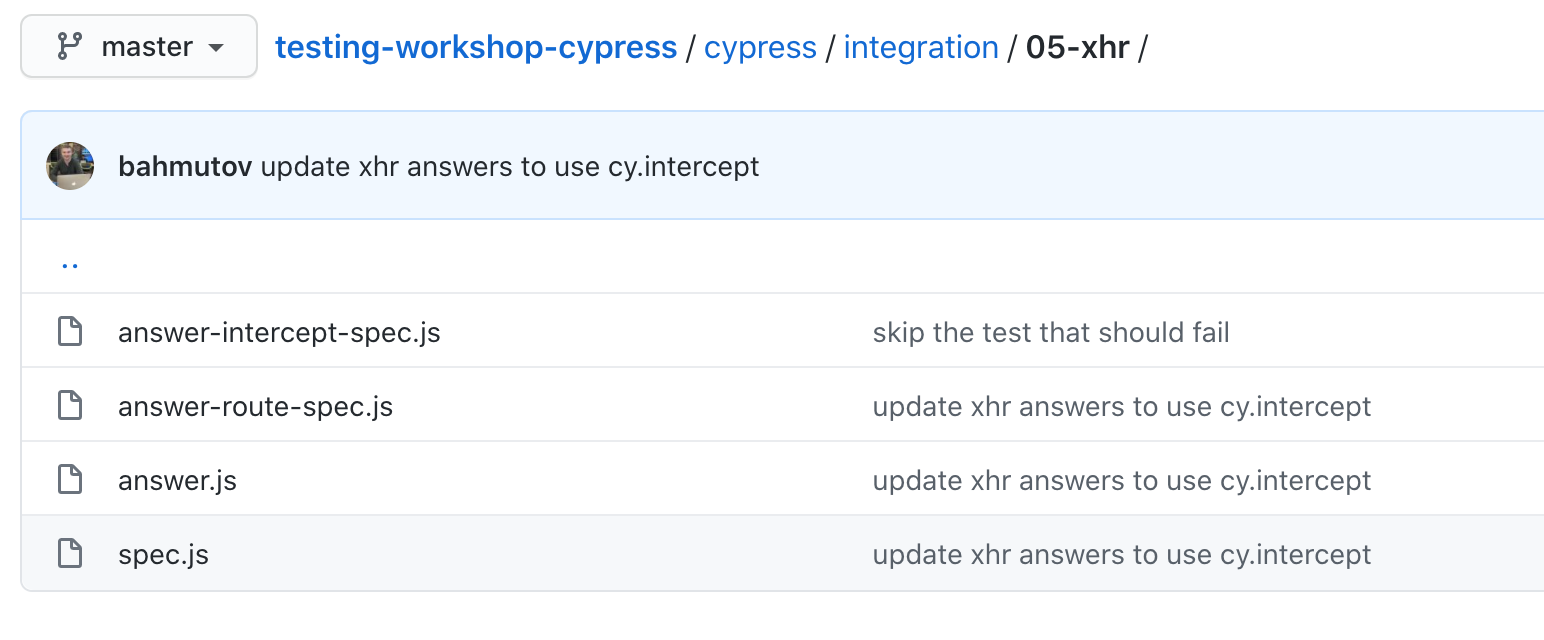
cy.route and cy.intercept equivalent tests
cy.intercept super power
Cypress
route handler can be programmatic
cy.intercept('POST', '/graphql', (req) => {
if (req.body.hasOwnProperty('mutation')) {
req.alias = 'gqlMutation'
}
})
// assert that a matching request has been made
cy.wait('@gqlMutation')Spy on some requests
*routeHandler but is a spy
cy.intercept('POST', '/graphql', (req) => {
if (req.body.hasOwnProperty('mutation')) {
req.reply({
data: {
id: 101
}
})
}
})if you call req.reply from the route handler, it becomes a stub*
Stub some requests
cy.intercept('POST', '/graphql', (req) => {
if (req.body.hasOwnProperty('mutation')) {
req.reply((res) => {
// 'res' represents the real destination's response
// three items in the response is enough
res.data.items.length = 3
})
}
})Change server's response

How it all works
cy.intercept(matcher, callback)
matcher
request
(via Cypress socket message)
Your callback code executes in the browser right where it was created
1
2
3
4
response
(via Cypress socket message)
stub
modified request

How it all works: response
cy.intercept(matcher, callback)
matcher
response
(via Cypress socket message)
You want to access the response with:
req.reply(res => {
...
})
1
2
3
modified response
(via Cypress socket message)
modified response
Warning: intercept happens AFTER the request has left the building browser
// server
app.get('/req-headers', (req, res) => {
res.json(req.headers)
})Request has left the browser
it('adds request header', () => {
cy.visit('/headers')
cy.intercept('/req-headers', (req) => {
req.headers['x-custom-headers'] = 'added by cy.intercept'
})
cy.get('#get-headers').click()
cy.contains('#output', 'accept-language')
.should('contain', 'x-custom-header')
.and('contain', 'added by cy.intercept')
})// server
app.get('/req-headers', (req, res) => {
res.json(req.headers)
})Request has left the browser
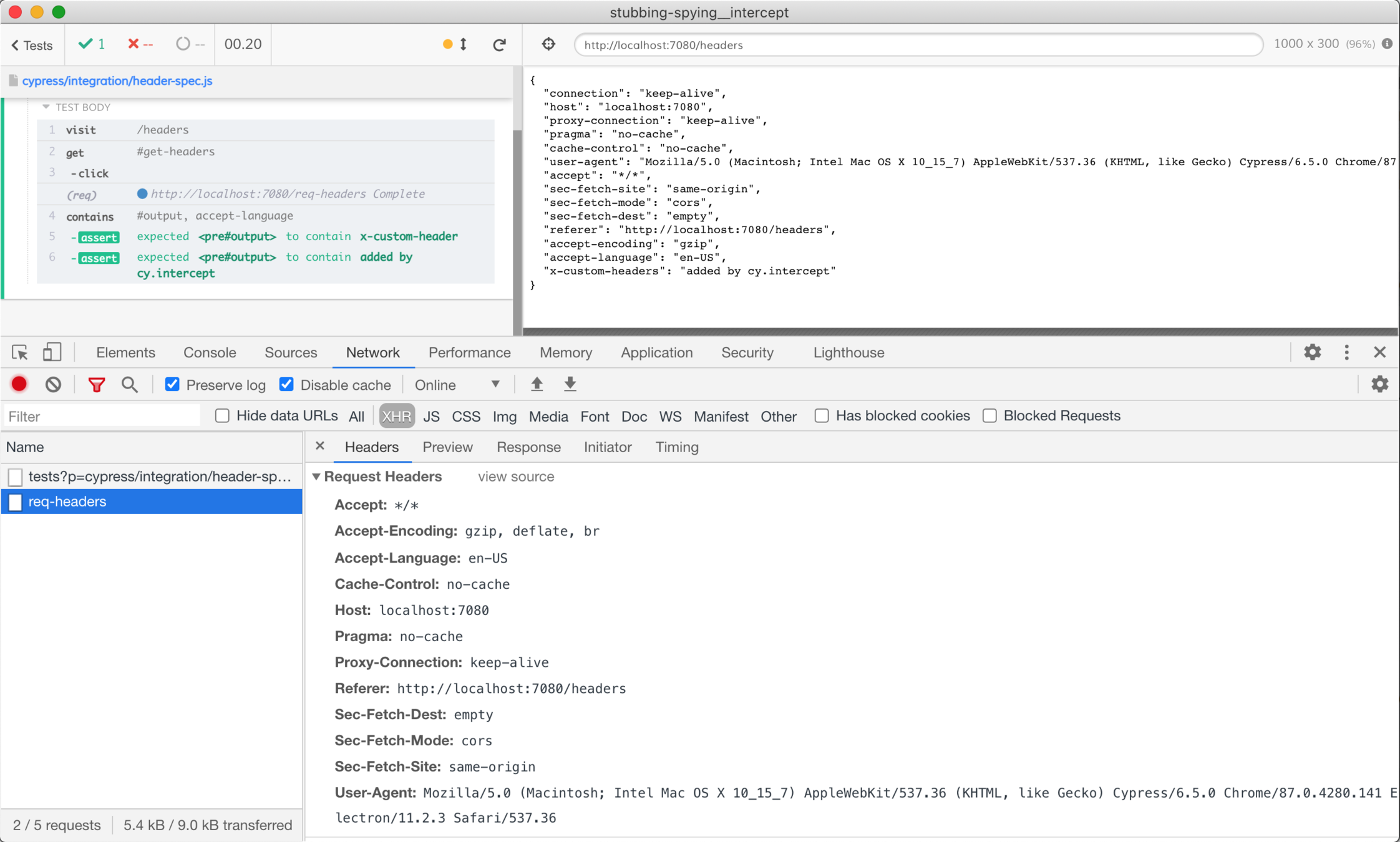
browser does not show the custom header we have added inside cy.intercept
added header was received by the server
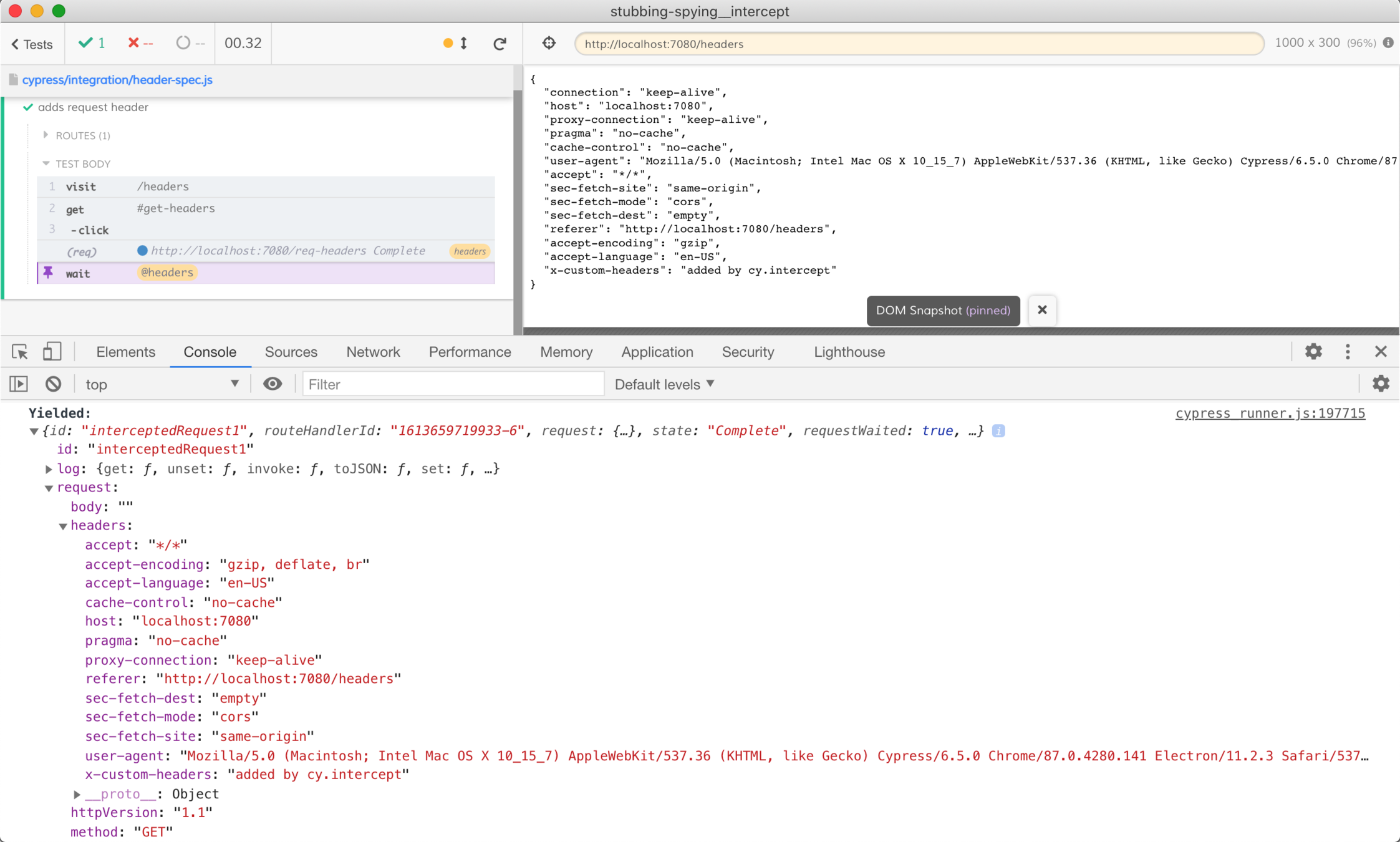
Added header is present in the data if you wait on the intercept
cy.intercept('/req-headers', (req) => {
req.headers['x-custom-headers'] = 'added by cy.intercept'
}).as('headers')
cy.get('#get-headers').click()
cy.wait('@headers').its('request.headers')
.should('have.property', 'x-custom-headers', 'added by cy.intercept')Some cool examples
-
change the HTML
-
change the CSS
-
network call does not happen
-
cy.intercept + cy.spy combo
-
cy.intercept + cy.clock
-
loading element
-
stubbing redirects
it('modifies the page itself', () => {
// we are only interested in the HTML root resource
cy.intercept({ pathname: '/' }, (req) => {
req.reply((res) => {
res.body += `<footer style="${style}">⚠️ This is a Cypress test ⚠️</footer>`
})
})
cy.visit('/')
cy.contains('footer', 'Cypress test')
.should('be.visible')
})change the HTML of the page
change the HTML of the page
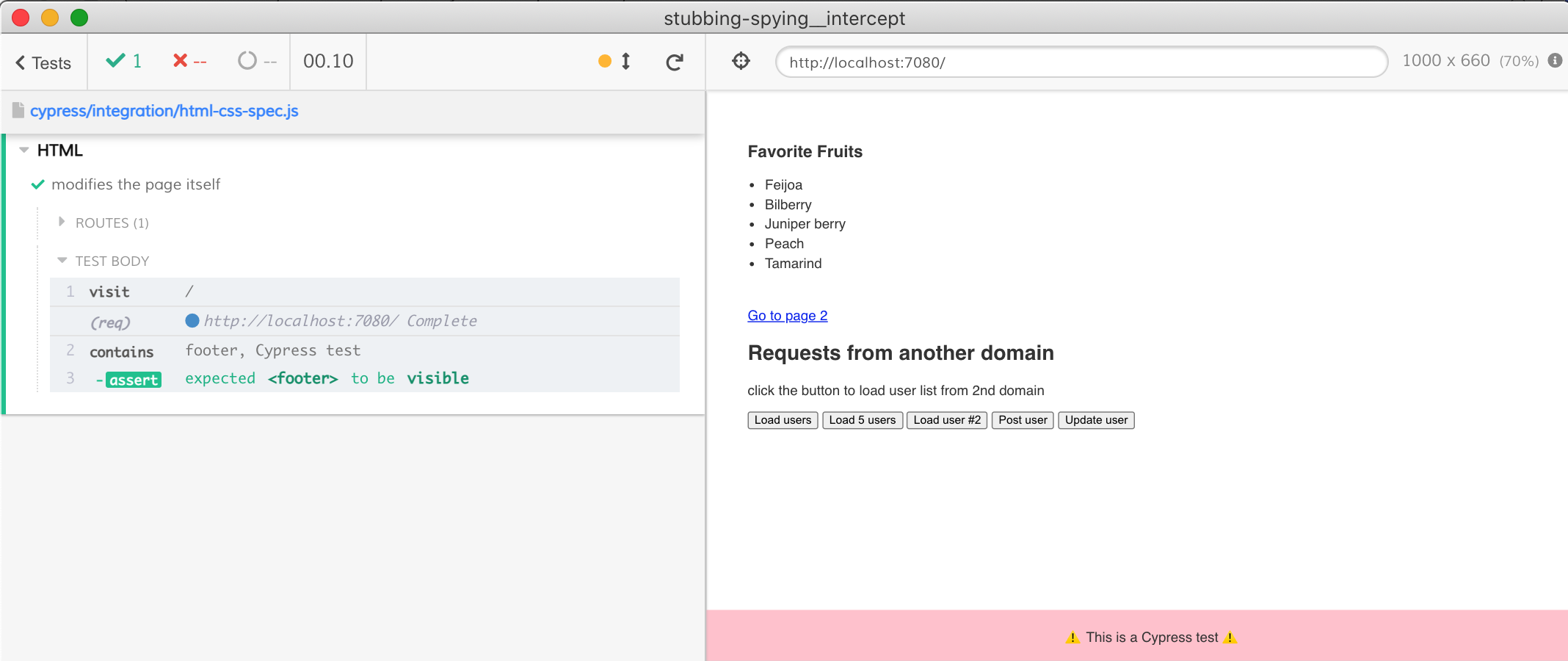
change CSS resource
it('highlights LI elements using injected CSS', () => {
cy.intercept('styles.css', (req) => {
delete req.headers['if-modified-since']
delete req.headers['if-none-match']
req.reply((res) => {
res.send(`${res.body}
li {
border: 1px solid pink;
}
`)
})
})
cy.visit('/')
// confirm the CSS was injected and applied
cy.get('li').should('have.length.gt', 1)
.first().invoke('css', 'border')
.should('be.a', 'string')
.and('include', 'solid')
})
change CSS resource
it('highlights LI elements using injected CSS', () => {
cy.intercept('styles.css', (req) => {
delete req.headers['if-modified-since']
delete req.headers['if-none-match']
req.reply((res) => {
res.send(`${res.body}
li {
border: 1px solid pink;
}
`)
})
})
cy.visit('/')
// confirm the CSS was injected and applied
cy.get('li').should('have.length.gt', 1)
.first().invoke('css', 'border')
.should('be.a', 'string')
.and('include', 'solid')
})caching & server response
Have to think if the browser caches the resource, or if the server responds with "not modified" empty response
using response to check UI
it('requests favorite fruits', function () {
cy.intercept('/favorite-fruits').as('fetchFruits')
cy.visit('/fruits.html')
cy.wait('@fetchFruits').its('response.body')
.then((fruits) => {
cy.get('.favorite-fruits li')
.should('have.length', fruits.length)
fruits.forEach((fruit) => {
cy.contains('.favorite-fruits li', fruit)
})
})
})using response to check UI

Data inside the intercept
// wait on the request once
cy.wait('@fetchFruits')
// but get the latest request as many times as needed
cy.get('@fetchFruits').its('response.statusCode')
.should('eq', 200)
cy.get('@fetchFruits').its('response.body')
.should('have.length.gt', 3)Multiple assertions against intercept
cy.wait + cy.get(s)
cy.wait('@fetchFruits').then(intercept => {
expect(intercept.response.statusCode, 'status code').to.equal(200)
expect(intercept.response.body, 'at least 3 fruits').to.have.length.gt(3)
})Multiple assertions against intercept
cy.wait + cy.then
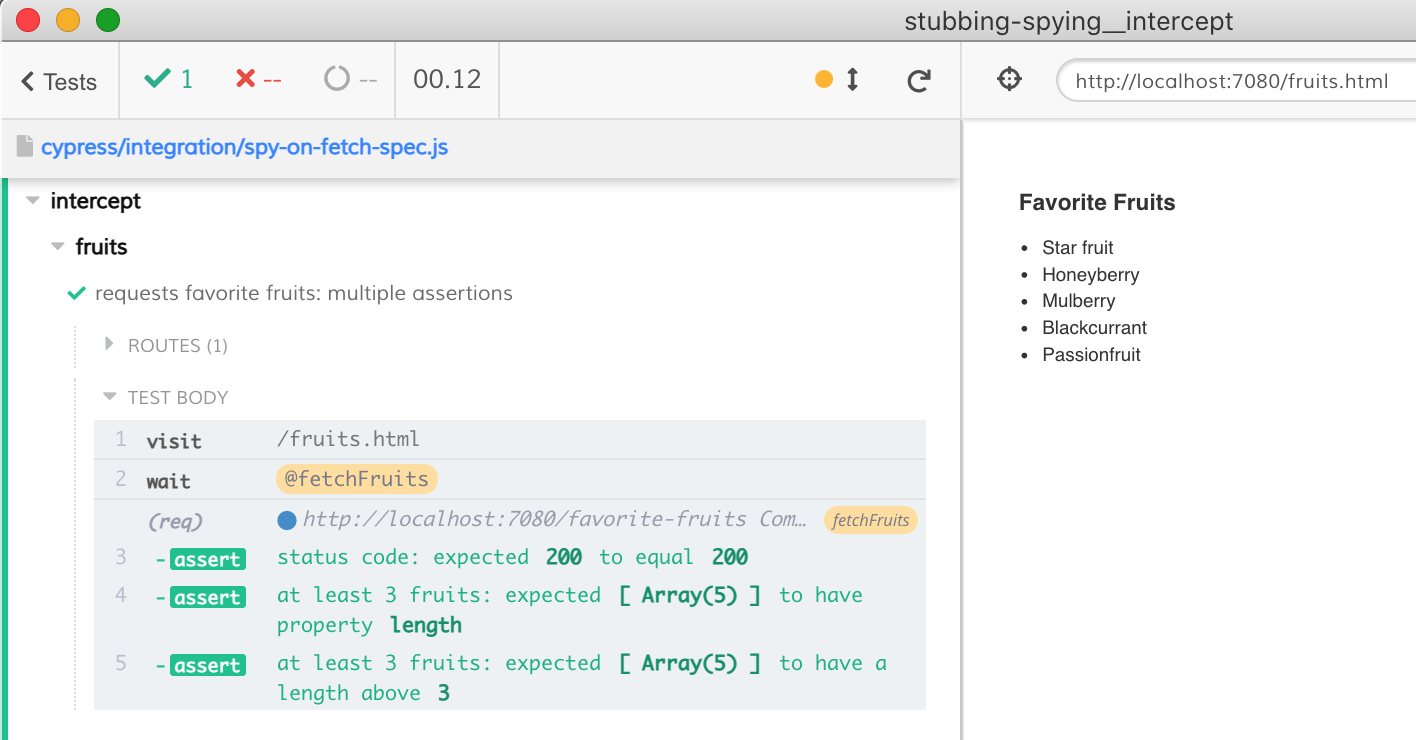
network call does not happen
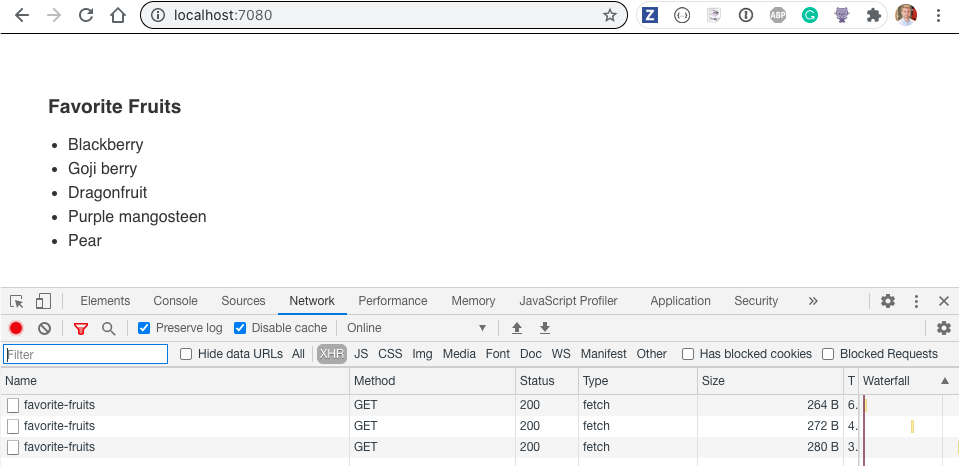
Every 30 seconds GET /favorite-fruits
network call does not happen
Confirm then GET /favorite-fruits happens once at the start
network call does not happen
it('does not fetch for at least five seconds', () => {
let polled
cy.intercept('/favorite-fruits', () => {
polled = true
})
cy.visit('/')
cy.wrap()
.should(() => {
expect(polled, 'fetched fruits').to.be.true
polled = false
})
// physically wait 5 seconds
cy.wait(5000)
.then(() => {
expect(polled, 'no new requests').to.be.false
})
})network call does not happen
network call does not happen
it('does not fetch for at least five seconds (cy.spy)', () => {
cy.intercept('/favorite-fruits',
cy.spy().as('reqForFruits') )
cy.visit('/')
// at some point the request happens
cy.get('@reqForFruits').should('have.been.calledOnce')
// physically wait 5 seconds
cy.wait(5000)
// new network calls have not happened
cy.get('@reqForFruits').should('have.been.calledOnce')
})Using cy.spy() to count calls
if you do not call req.reply() it is a network spy
network call does not happen
network call does not happen
Confirm then GET /favorite-fruits happens every 30 seconds
without waiting
cy.visit('/')
cy.get('@reqForFruits').should('have.been.calledOnce')
cy.wait(30000)
cy.get('@reqForFruits').should('have.been.calledTwice')⛔️
cy.intercept + cy.clock
it('fetches every 30 seconds', () => {
cy.clock()
cy.intercept('/favorite-fruits', cy.spy().as('reqForFruits'))
cy.visit('/fruits.html')
// at some point the request happens
cy.get('@reqForFruits').should('have.been.calledOnce')
cy.tick(5000)
// no new network calls
cy.get('@reqForFruits').should('have.been.calledOnce')
// but add 25 more seconds, and the app should have made a network call
cy.tick(25000)
cy.get('@reqForFruits').should('have.been.calledTwice')
})cy.intercept + cy.clock
loading element
loading element: find it
it('shows loading element', () => {
cy.intercept('/favorite-fruits', {
body: ['Apple', 'Banana', 'Cantaloupe'],
delay: 25000
})
cy.visit('/fruits.html')
})loading element: find it
loading element: test it
it('shows loading element', () => {
cy.intercept('/favorite-fruits', {
body: ['Apple', 'Banana', 'Cantaloupe'],
delay: 1000
})
cy.visit('/fruits.html')
cy.get('.loader').should('be.visible')
cy.get('.loader').should('not.exist')
})loading element: test it
Is 1 second enough? Or too much?
loading element: promise
it('slows the reply by returning a Promise', () => {
const fruits = ['Apple', 'Banana', 'Cantaloupe']
cy.intercept('/favorite-fruits', (req) =>
Cypress.Promise.delay(1000, fruits).then(req.reply)
)
cy.visit('/fruits.html')
cy.get('.loader').should('be.visible')
cy.get('.loader').should('not.exist')
})loading element: promise
it('shows loading element for as little as possible', () => {
let sendResponse
const p = new Cypress.Promise((resolve) => {
// save the resolve method
// so this promise resolves when we call it
sendResponse = resolve
})
cy.intercept('/favorite-fruits', (req) => {
// wait for the trigger promise to resolve
return p.then(() => req.reply(['Apple', 'Banana', 'Cantaloupe']))
})
cy.visit('/fruits.html')
cy.get('.loader').should('be.visible').then(sendResponse)
cy.get('.loader').should('not.exist')
})loading element: test faster
loading element: test faster
it('stubs the redirect', () => {
cy.intercept('/getout', (req) => {
req.reply((res) => {
expect(res.statusCode).to.equal(302)
// the server wants to redirect us to another domain
expect(res.headers).to.have.property('location', 'https://www.cypress.io')
res.headers.location = '/'
// need to provide something for the updated "res"
// object to be used
// https://github.com/cypress-io/cypress/issues/9555
res.send('stay here')
})
})
cy.get('#getout').click()
cy.location('pathname').should('equal', '/') // redirect worked
})stub redirects
stub redirects
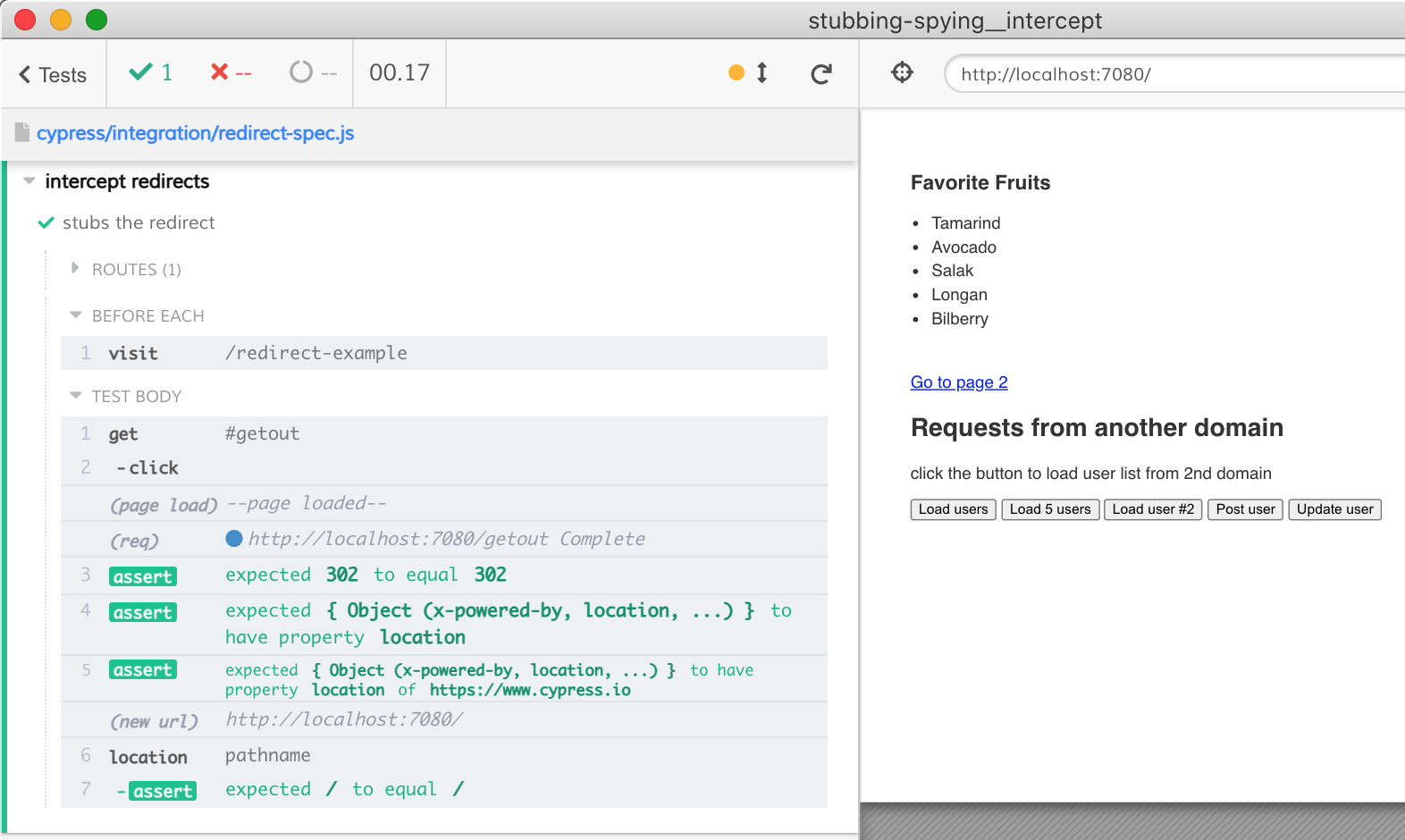
cy.intercept "problems"
Change the response
it('returns different fruits every 30 seconds', () => {
cy.clock()
let k = 0
// return difference responses on each call
cy.intercept('/favorite-fruits', (req) => {
k += 1
switch (k) {
case 1:
return req.reply(['apples 🍎'])
case 2:
return req.reply(['grapes 🍇'])
default:
return req.reply(['kiwi 🥝'])
}
})
cy.visit('/fruits.html')
cy.contains('apples 🍎')
cy.tick(30000)
cy.contains('grapes 🍇')
cy.tick(30000)
cy.contains('kiwi 🥝')
})changing the response
changing the response
// return difference responses on each call
const responses = [
['apples 🍎'], ['grapes 🍇']
]
cy.intercept('/favorite-fruits', (req) => {
req.reply(responses.shift() || ['kiwi 🥝'])
})equivalent code
You can program your own logic to dynamically vary intercepts
We are still trying to come up with a general way to overwrite interceptors
Issues with label "pkg/net-stubbing"
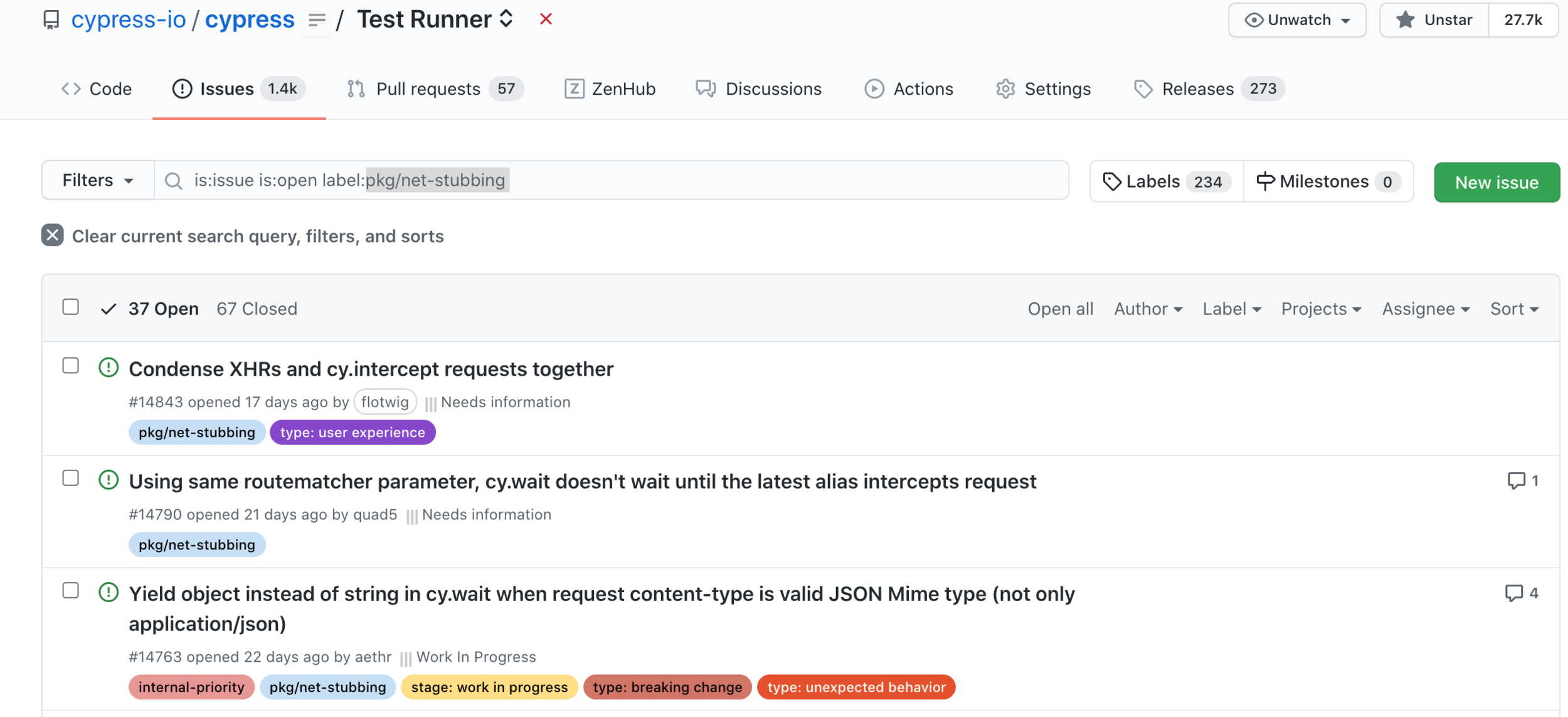
Plus closing bugs
More info:
https://on.cypress.io/intercept
https://glebbahmutov.com/blog/cy-route-vs-route2/
https://github.com/cypress-io/cypress-example-recipes
https://glebbahmutov.com/blog/cypress-intercept-problems/
https://github.com/cypress-io/testing-workshop-cypress
https://slides.com/bahmutov/how-cy-intercept-works
https://www.youtube.com/glebbahmutov
@bahmutov